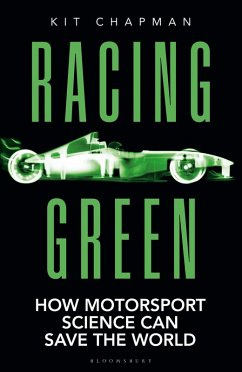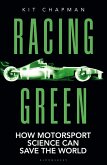Racing Green is the story of how motorsport science has become smarter and more environmentally friendly, and how these developments on the track are changing the world.
Motor racing is the most scientifically demanding sport in the world: a combination of peak physical and mental skill, world-class mechanical nous and technological innovation. Ideas first pioneered during races - from ABS brakes to crash helmets - have been incorporated into car designs around the world to improve racing safety. And cleaner technologies first trialled and improved in modern racing are also informing the designs of everyday vehicles, such as better electric cars and more efficient fuels and tyres.
Racing Green is the story of how motorsport science has changed the world, helping it become smarter and more environmentally friendly. From the radical shake-ups of safety in the 1970s through to innovations such as the lithium-ion battery, this book explores the science that has been translated from racing to the road. It looks at the history of motor racing, both its glories and its tragedies, and demonstrates how these moments led to some of the most important modern developments we see in car design today. It explores how motor racing is not only at the cutting edge of modern engineering, but also human psychology and physiology, both of which are integral to creating a winning car and driver.
Author Kit Chapman is a lifelong motorsports fan who has previously worked with Virgin Racing's Formula E team to explore the chemistry and material science of their racing cars. With cooperation from his wide range of contacts in the industry, he goes behind the scenes of the current breakthroughs to show where motorsport is likely to take us in the future, picking up extraordinary tales along the way, such as the maverick designer Warren Mosler, who designed a car that was so fast he wasn't allowed to race it.
Racing Green is a mix of travelogue and historical retrospective, combining visits to the experts and discussing the science with retellings of real-life incidents that represent milestones in modern car development.
Motor racing is the most scientifically demanding sport in the world: a combination of peak physical and mental skill, world-class mechanical nous and technological innovation. Ideas first pioneered during races - from ABS brakes to crash helmets - have been incorporated into car designs around the world to improve racing safety. And cleaner technologies first trialled and improved in modern racing are also informing the designs of everyday vehicles, such as better electric cars and more efficient fuels and tyres.
Racing Green is the story of how motorsport science has changed the world, helping it become smarter and more environmentally friendly. From the radical shake-ups of safety in the 1970s through to innovations such as the lithium-ion battery, this book explores the science that has been translated from racing to the road. It looks at the history of motor racing, both its glories and its tragedies, and demonstrates how these moments led to some of the most important modern developments we see in car design today. It explores how motor racing is not only at the cutting edge of modern engineering, but also human psychology and physiology, both of which are integral to creating a winning car and driver.
Author Kit Chapman is a lifelong motorsports fan who has previously worked with Virgin Racing's Formula E team to explore the chemistry and material science of their racing cars. With cooperation from his wide range of contacts in the industry, he goes behind the scenes of the current breakthroughs to show where motorsport is likely to take us in the future, picking up extraordinary tales along the way, such as the maverick designer Warren Mosler, who designed a car that was so fast he wasn't allowed to race it.
Racing Green is a mix of travelogue and historical retrospective, combining visits to the experts and discussing the science with retellings of real-life incidents that represent milestones in modern car development.









